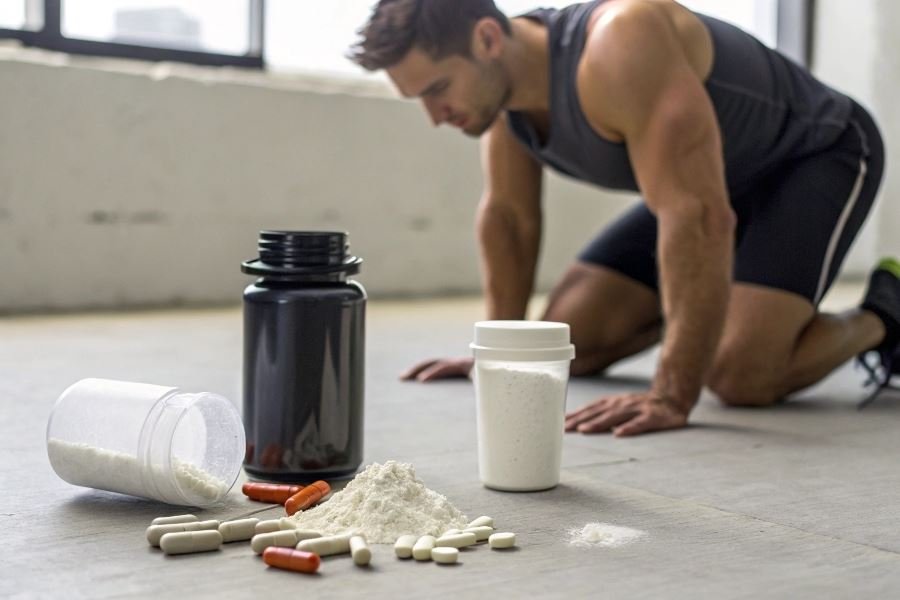
Ever wondered why some athletes seem to have an endless gas tank while others hit the wall? The secret might be in the supplement stack.
When the difference between victory and defeat comes down to seconds, endurance athletes are constantly searching for that extra edge. Cyclic sports like running, swimming, and cycling demand extraordinary stamina—the ability to maintain performance intensity over extended periods while fighting off fatigue. This isn’t just about willpower; it’s about biochemistry.
The endurance equation
Endurance in cyclic sports represents your body’s efficiency at converting fuel into forward motion. It’s the physiological capacity to sustain repeated muscle contractions while delaying the onset of fatigue. Elite marathon runners, Tour de France cyclists, and Olympic swimmers don’t just train differently—they fuel differently.
“Supplements don’t create champions, but champions rarely compete without them.” – Dr. Louise Bennett, Sports Nutrition Researcher
Beyond the training plan
While structured training forms the foundation of endurance development, strategic supplementation can address specific physiological limitations. The most effective endurance supplements work by:
- Enhancing oxygen delivery to working muscles
- Buffering lactic acid to delay the burning sensation
- Optimizing energy production at the cellular level
- Accelerating recovery between training sessions
The evidence behind the claims
The supplement industry is filled with bold promises, but research tells a more nuanced story. Studies published in the Journal of the International Society of Sports Nutrition have demonstrated that certain compounds—like beetroot nitrates, caffeine, and beta-alanine—consistently improve endurance metrics when properly dosed. These aren’t magic pills but rather targeted tools that optimize specific physiological processes already occurring in your body.
When integrated with proper nutrition and progressive training, the right supplements don’t just add seconds to your performance—they transform your relationship with endurance itself.
Evidence-Based Supplements That Actually Boost Endurance
When you’re pushing through that final mile or struggling to maintain pace during a long training session, your body’s endurance capabilities become everything. The best supplements for increasing endurance in cyclic sports like running, cycling, and swimming can provide that crucial edge when physical preparation meets its limits. Let’s dive into the science-backed options that genuinely deliver results.
Caffeine: Your Reliable Endurance Ally
Caffeine isn’t just for morning alertness—it’s arguably the most well-researched ergogenic aid for endurance athletes. Studies consistently show performance improvements of 2-4% in time trials and extended efforts.
How it works: Caffeine blocks adenosine receptors, reducing perceived exertion while increasing fat oxidation and sparing precious glycogen stores. It also enhances calcium release in muscles, improving contraction efficiency.
The timing and dosage are critical:
- Optimal dose: 3-6mg per kg of body weight
- Timing: 45-60 minutes before exercise
- Format options: Pills, gum, or good old coffee
Pro tip: Caffeine sensitivity varies dramatically between individuals. Start with a lower dose (2mg/kg) during training before implementing in competition.
Beta-Alanine: The Lactic Acid Buffer
When you’re pushing hard in that middle-distance sweet spot (1-4 minutes of high-intensity effort), beta-alanine becomes your secret weapon against the burning sensation that forces you to slow down.
The science: Beta-alanine combines with histidine in your muscles to form carnosine, which acts as a powerful buffer against the hydrogen ions that contribute to acidosis during high-intensity exercise.
| Duration of Exercise | Expected Improvement |
|---|---|
| 0-60 seconds | Minimal benefit |
| 1-4 minutes | 2-3% improvement |
| 4+ minutes | 1-2% improvement |
For optimal results:
- Daily dose: 3.2-6.4g
- Loading period: 4-12 weeks for full effect
- Strategy: Split into smaller doses (1.6g) throughout the day to reduce tingling sensation
Beetroot and Nitrates: Oxygen Efficiency Boosters
The vibrant purple juice that stains everything it touches has earned its place in the endurance athlete’s supplement arsenal through solid science.
Performance mechanism: Dietary nitrates from beetroot convert to nitric oxide in the body, reducing the oxygen cost of exercise by improving mitochondrial efficiency and enhancing blood flow to working muscles.
Research shows beetroot supplementation can:
- Reduce oxygen consumption by ~3-5% at the same workload
- Improve time trial performance by 1-3%
- Enhance exercise tolerance in high-intensity intervals
Implementation strategy:
- Effective dose: 300-600mg of nitrates (roughly 500ml beetroot juice)
- Timing: 2-3 hours pre-exercise
- Duration: Both acute and chronic loading protocols show benefits
The nitrate content in beetroot juice from Beet It Sport has been standardized and used in many research studies, making it a reliable option.
These evidence-based supplements offer tangible benefits for endurance athletes, but remember that individual response varies. The foundation remains proper training, nutrition, and recovery—supplements simply help maximize the return on that investment.
Maximizing Your Endurance: The Strategic Supplement Approach
Timing supplements with training phases
The secret to endurance success isn’t just what supplements you take—it’s when you take them. Elite cyclists and marathon runners don’t randomly consume supplements; they orchestrate them around training cycles with surgical precision.
During base-building phases, focus on foundational supplements like vitamin D and omega-3s to support overall health and recovery. As you transition to higher-intensity training blocks, gradually introduce performance-specific supplements like beta-alanine, which requires a 4-6 week loading period to reach optimal muscle carnosine levels.
Pre-competition strategy: 7-10 days before major events, many endurance athletes implement carb-loading protocols alongside targeted supplement timing. Research published in the Journal of the International Society of Sports Nutrition shows that beetroot juice consumption peaks in effectiveness when consumed 2-3 hours before exercise, while caffeine reaches maximum blood concentration 45-60 minutes post-ingestion.
The difference between good and great often comes down to timing—not just training harder, but supplementing smarter.
Create a periodized supplement calendar that aligns with your training phases:
| Training Phase | Primary Supplements | Timing Strategy |
|---|---|---|
| Base Building | Vitamin D, Iron, Omega-3s | Daily maintenance |
| Build Phase | Add Beta-alanine, Creatine | Loading protocols |
| Peak/Race Phase | Beetroot juice, Caffeine | Acute performance timing |
| Recovery | Protein, Tart cherry | Immediately post-exercise |
Understanding supplement safety boundaries
Even the most effective supplements come with potential downsides. Caffeine, while proven effective for endurance, can cause jitteriness, sleep disruption, and increased heart rate when consumed above 6mg per kg of body weight.
Individual response variations matter. Some athletes experience gastrointestinal distress with certain carbohydrate formulations or sodium bicarbonate. Start with lower doses and monitor your body’s response before competition day.
Iron supplements, critical for many endurance athletes, should only be taken after confirming deficiency through blood testing. Excessive iron supplementation can lead to oxidative stress and liver damage.
Age and existing health conditions also influence supplement safety. Athletes over 40 should exercise additional caution with stimulant-based supplements and consult healthcare providers, especially with pre-existing cardiovascular conditions.
The nutrition-supplement synergy effect
Supplements work with your nutrition, not instead of it. The most sophisticated supplement regimen will fail without proper nutritional foundations.
Hydration amplifies supplement effectiveness. Creatine requires adequate water intake to maximize muscle uptake and prevent cramping. Similarly, electrolyte supplements function optimally when overall hydration status is maintained.
Protein timing creates a multiplier effect. Research shows that consuming 20-25g of high-quality protein within 30 minutes post-exercise, alongside recovery supplements like tart cherry extract, significantly enhances recovery compared to either strategy alone.
Carbohydrate intake should be synchronized with supplement timing. For example, consuming caffeine alongside carbohydrates during exercise has been shown to increase carbohydrate oxidation rates by up to 26%, enhancing endurance performance beyond what either would provide independently.
Create personalized supplement-nutrition protocols by tracking your response to different combinations. The most effective endurance athletes don’t just follow generic recommendations—they discover their unique formula through methodical self-experimentation and precise record-keeping.
